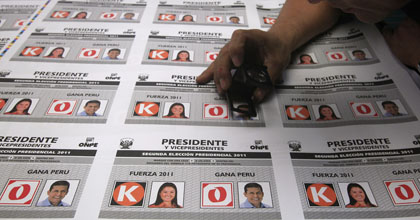Keiko Fujimori and Ollanta Humala, the two candidates for the June 5 presidential runoff in Peru, barely raised freedom of expression issues during the political campaign. So Friday’s event organized by the regional press group Instituto Prensa y Sociedad (IPYS) in Lima provided a great opportunity to measure their commitment on press freedom, especially important for candidates with questionable democratic credentials.
Both carry heavy human rights-related baggage. In 2009, Fujimori’s father Alberto Fujimori was sentence to 25 years in jail on charges of crimes against humanity, and later handed another six years for secretly wiretapping politicians and journalists during his decade in power. Fujimori was also accused of buying off a television station and a newspaper editorial board to back his 2000 re-election campaign.
On the other hand, Humala, a former lieutenant colonel, has been accused of grave human rights abuses, including torture and “disappearing” people, while commanding an army base in 1992. Humala’s younger brother Antauro is in jail serving a 25-year sentence for leading a fierce uprising against former President Alejandro Toledo in 2005.
The event at IPYS’ offices in the Lima district of Barranco gathered vast media attention. The presentation of the candidates was preceded by a panel of leading regional press freedom advocates from Ecuador, Venezuela, Bolivia, and Colombia. César Ricaurte, executive director with the Quito-based press group Fundamedios; Ewald Scharfenberg, director of IPYS Venezuela; Andrés Morales, executive director of the Colombian group Foundation for Freedom of the Press (FLIP); and José Antonio Pomacuzi, with the Bolivian publisher’s group National Association of the Press discussed problems in the Andean region.
Later in the morning, prominent Uruguayan journalist Danilo Arbilla, former president of the Inter-American Press Association, debated whether journalists should support the editorial line of a media outlet when reporting the news. Before the arrival of the candidates, I gave a 20-minute overview on press freedom conditions in the Americas.
IPYS had prepared a detailed questionnaire for Fujimori and Humala, with queries ranging from their understanding of the role of the press, regulation of radio, TV and the Internet, reaction against criticism, regulation of official advertising, stance on criminal defamation, and access to public information, among other important questions. It was a formidable way to scrutinize the candidates and later compare with their actions in office.
Fujimori, 35, the conservative candidate with a graduate degree in business from Columbia University, was the first to arrive. After giving a brief statement, she answered all the questions and tried to make clear that she had no intention of restoring her father’s corrupt and authoritarian regime. Fujimori said that, if elected, she will be tolerant of criticism and will promote legislation to decriminalize defamation. Radio, TV, and the Internet would be regulated by an autonomous, independent body, and she said she would not manipulate the distribution of official advertising. She condemned the buying of editorial lines during her father’s government.
Humala arrived after Fujimori left. The left-wing nationalist contender said that his government will respect the free exercise of journalism, and won’t interfere with critics. He said that he will create a public service television station to serve the interests of all Peruvians, democratize the airwaves to allow all voices to be heard, and that he will not sue critical journalists. Humala made efforts to distance himself from Venezuelan President Hugo Chávez, whom he expressed admiration during the presidential run in 2006. “The Venezuelan model is not applicable in Peru,” he said.
Almost a month away from the runoff election, Fujimori and Humala are in a statistical tie, according to the latest polls. Although both candidates have emphasized the importance of a free and independent press for a transparent society, their respective pasts cast doubt on their commitment. “In the next weeks, they will proclaim themselves more to be democratic than Jefferson and Lincoln combined,” wrote prominent investigative journalist and former CPJ awardee Gustavo Gorriti in a recent column published in the weekly Caretas.
